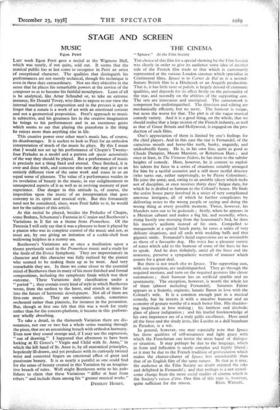THE CINEMA
" Ignace." At the Film Society
THE choice of this film for a special showing by the Film Society was clearly in order to give its audience some idea of another side of the French film trade to that which is customarily represented at the various London cinemas which specialise in Continental films. Ignace is to Carnet de Bal as is a second- feature British film to a Hitchcock or an Asquith production. That is, it has little taste or polish, is largely devoid of cinematic qualities, and depends for its effect firstly on the personality of the star, and secondly on the abilities of the supporting cast. The sets are innocuous and unoriginal. The camerawork is competent but undistinguished. The direction and editing are mechanically efficient, but no more. The humour is vulgar, but none the worse for that. The plot is of the vague musical comedy variety. And it is a good thing, on the whole, that we should realise that a large section of the French industry, as well as that of Great Britain and Hollywood, is engaged on the pro- duction of such films.
One's appreciation of them is limited by one's feelings for the chief players. And in this case the star is Femandel, of the capacious mouth and horse-like teeth, husky, ungainly, and undoubtedly funny. He is, in his own line, quite as good as Claude Dampier, Moore Marriott, or Robertson Hare ; and once at least, in The Virtuous Isidore, he has risen to the subtler heights of comedy. Here, however, he is content to exploit his talents for farce in a series of situations suitably arranged for him by a tactful scenarist and a still more tactful director (who turns out, rather surprisingly, to be Pierre Colombier). He joins the army, and, owing to an amiable idiocy which reeks not of discipline, at once receives thirty days' fatigue duty, for which he is drafted as batman to the Colonel's house. He finds the entire house party involved in a series of very complicated amorous intrigues, all of which he further complicates by delivering notes to the wrong people or saying and doing the wrong thing at every possible moment. Twice, however, his blunders turn out to be godsends ; firstly, when he appears in a Mexican cabaret and makes a big hit, and secondly, when, rising hastily one morning from the housemaid's bed, he dons his master's uniform instead of his own. Compelled to masquerade at a special lunch party, he saves a series of very delicate situations, and all ends with wedding beat and that gigantic smile. Femandel's facial expressions are as irresistible as those of a favourite dog. His voice has a pleasant variety of tones which add to the humour of some of the lines he has to speak. And he does definitely, amid all the farce and the nonsense, preserve a sympathetic warmth of manner which counts for a great deal.
But there is not much else to Ignace. The supporting cast, with one exception, are undistinguished. They go through the required motions, and turn on the required gestures like clever automatons ; their humour has an artificial sparkle and no spontaneity. The exception, however, is worth the whole lot of them (almost including Fernandel). Saturnin Falore appears as a frenetic, orgiastic, lunatic Baron in love with the Colonel's wife. It is a common enough part in a musical comedy, but he invests it with a macabre humour and an economy of gesture worthy of a much better film. His shudder- ing ineptitude at love making ; his lambent and alcoholic glare of glassy indignation ; and his fearful foreknowledge of his own impotence are of a truly gallic excellence. Here amid all the farce and the shady jests, like Lucifer at a dull beanfeast in Paradise, is a wit.
In general, however, one may especially note that Ignace has those qualities of self-assurance and light grace with which the Frenchman can invest the most banal of dialogue or situation. It may perhaps be due to the language, which in form and inflection is nicely complex and highly liberal ; or it may be due to the French tradition of gesticulation which makes the chatter-chatter of Ignace less unendurable than that of an English film of the same nature. Be that as it may, the audience at the Film Society no doubt enjoyed the joke and delighted in Fernandel ; and that perhaps is a not unwel- come change from the more social studies of cinema which is the Society's raison d'être. One film of this type is, however, quite sufficient for the season. BASIL WRIGHT.


































 Previous page
Previous page